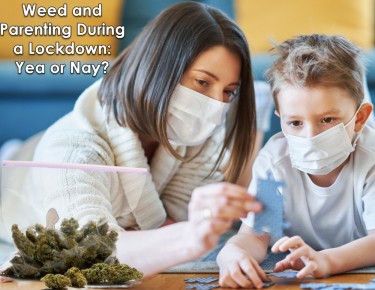
Pot for Parenting – How Cannabis Makes You a Better Parent and Partner
The Benefits Of Marijuana For Parenting – Does Cannabis Make You A Better Parent?
Raising children is no joke.
The extreme pressures parents face to put food on the table, raise socially and morally responsible citizens, make ends meet, take care of their own careers are just a few of the real problems parents face . It can be so hard at times that parents get so caught up in their roles and often forget to take care of themselves and their relationships with their spouses, and this can lead to despair – leading to substance abuse and other bad habits.
Regular use of cannabis has become the secret of successful parents. You’ve found that a safe and healthy way to cope with the demands of parenthood, which can easily take 18 years of your life before a child goes to college. While there are still many people who are opposed to parental use of cannabis, there is no denying its numerous benefits for parents.
What the studies say
In fact, a recent Oxford study found that the existence of adult cannabis laws was linked to a decrease in foster care placements. The study, conducted by economists at the University of Mississippi, analyzed patterns of foster care admissions in states before and after the legalization of adult cannabis use.
your insights?
“Our most conservative estimates suggest that legalization will result in a reduction in the overall number of foster care placements of at least 10 percent due to specific child welfare concerns,” the study said.
“Legalization can impact foster care placements directly by changing children’s well-being, or indirectly by changing policies and attitudes about home marijuana use. Direct effects may arise because marijuana use itself causes behaviors that affect children’s well-being or because it alters the likelihood of using other drugs,” the authors said.
“We also find that placements for physical abuse, parental neglect, and parental incarceration decrease after legalization, demonstrating that legalization reduces material threats to child welfare, although the precise mechanism behind these effects is unclear,” they add .
Another 2019 study involving 32 adult medical marijuana patients who participated in a focus group discussion provided some insights into why parents take medication. The authors of the study wanted to better understand how marijuana use affects parenting.
Six out of 11 participating parents said cannabis use has helped them become calmer, making it easier to deal with difficult emotions that come with parenthood. However, it was also interesting that some noted that they did not want their children to use cannabis. More importantly, the study results showed that MMJ sufferers who are parents can actually benefit from alternative ways to deal with the stress caused by parenthood.
There is also ample anecdotal evidence from parents that it actually calms them down and helps them become a better parent without the harmful and potentially dangerous side effects of other coping mechanisms like alcohol and hard drugs that can increase the chances of domestic violence.
How Cannabis Helps Parents
Emphasize: From sleepless nights looking after infants and toddlers to the general frustration of raising children and the endless list of daily tasks in between that make parenting perhaps the most stressful job on earth.
Parenting is extremely overwhelming, and the longer parents deal with stress alone, the more it can lead to depression, anxiety, trouble sleeping, and physical ailments related to inflammation and muscle tension. Cannabis has been consistently proven in numerous studies to be an effective treatment for stress and anxiety. It should also be said that chronic exposure to stress can transform a person, and if you want to be the best for your child, cannabis can help you find yourself again and look your best.
anger management: Any parent can tell you that raising children often comes with numerous annoying episodes. Explosive outbursts can easily ruin the trust you have with your child and it can also degrade the relationship you have with your spouse.
Research shows that cannabis can be a good antidote to anger. It’s also a much better way to deal with anger than alcohol, which can only make it worse. Cannabis contains essential cannabinoids that can help stabilize mood disorders, and for parents, this can mean the difference between a good day and a bad one – for you and your family.
Sleep: From the moment you become a parent, you can say goodbye to peaceful hours of sleep. As your child grows up, there will also be inevitable periods that will drive you into insomnia due to certain problems. It could be your child’s health, school, making ends meet, difficult in-laws and much more.
No matter what makes you lose sleep, cannabis has you covered. A few hits or a quality indica product will better ensure that you get a good night’s sleep and are more restful the next day. The lack of sleep can also lead to mood disorders, so getting 8 hours of restful sleep can make a world of difference in ensuring you are rested and prepared for the challenges ahead.
Conclusion
These days, parents have so many more choices when it comes to discreet medication.
There are vapes, gels, capsules, tinctures, drinks, and edibles that make calming down after a stressful day effective, but also easier than ever. If you’re the type of person who doesn’t want to get high, that’s fine: you can microdose by taking tiny puffs of your vapor or consuming edibles that have been infused with low doses of THC, which studies have shown to do treating stress can be beneficial, while a high THC strain can aggravate stress.
Cannabidiol (CBD), the non-psychoactive compound in the cannabis plant, is also very powerful in inducing calm and relaxation. CBD products are widely available in legal states, and for parents struggling with anger, frustration, and high levels of stress, CBD may be the best route for you.
PARENTS, COVID AND CANNABIS, READ THIS..

CANNABIS DURING COVID FOR PARENTS, YES OR NOW?

Post a comment: